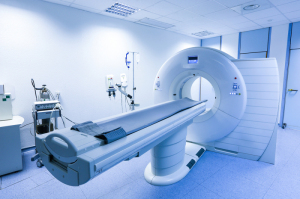

By: Cris Bennett, Analyst at MD Buyline
One of the most important decisions when purchasing a CT scanner is the addition of a service contract.
The major vendors have a multitude of service offerings that range from tube coverage only, to Bio-Medical Engineer (BME) first call, all the way to a premium, all-inclusive service contract. When considering a service contract, it’s a best practice to purchase the contract at the same time you purchase the equipment, as “after-point-of-sale” contracts are typically priced quite a bit higher.

![]()
Reveal Mobi Pro integrates the Reveal 35C detector with SpectralDR technology into a modern mobile X-ray solution. Mobi Pro allows for simultaneous acquisition of conventional & dual-energy images with a single exposure. Contact us for a demo at no cost.

All CT service contracts are tube-metrics based. The type of metrics — scan seconds, rotations, patients and exams — differs for each vendor. Because CT offers quick and accurate diagnosis, it is becoming more prevalent in most EDs, and the tube metrics have increased relative to the available technology of the system. For example, if a facility with a 16-slice CT is purchasing a 64-slice CT, the coverage should include not only what it was scanning with the previous system, but also include future capabilities. This forward thinking will save a facility from paying overage fees when it exceeds the number of covered metrics.
Another consideration in CT service contracts is the coverage period. With most facilities running their CT systems 24 hours a day, 8 a.m. to 5 p.m. coverage is insufficient for many departments. As a result, many facilities are considering coverage until 10 p.m. or even 2 a.m. On-site response is another aspect of the contract that needs to be assessed. If a facility has a system go down and does not have a back-up CT, a guaranteed four-hour, on-site response may not be fast enough. A two-hour, on-site response may be better suited for that facility.
Facilities that have a high-volume CT in the ED should consider a shorter response time.
In today’s world of technologically advanced CT systems, the CT is connected to the vendor in real time. Vendor service personnel can diagnose and order parts, if necessary, before they arrive at the facility. Some vendors offer a software solution that lets service personnel know when the system has a failure or fault that is occurring or about to occur. This option helps to keep a consistent workflow and allows for scheduled downtime when components begin to fail instead of unscheduled downtime at the point of component failure.
All full-service contracts include replacement parts coverage. If a facility is leaning toward a BME first call contract, it should ensure that the contract includes parts or, at the very least, a discount on replacement parts. A CT system has many parts that can either malfunction or stop working completely over the period of the contract, and the facility should be prepared when that time comes.